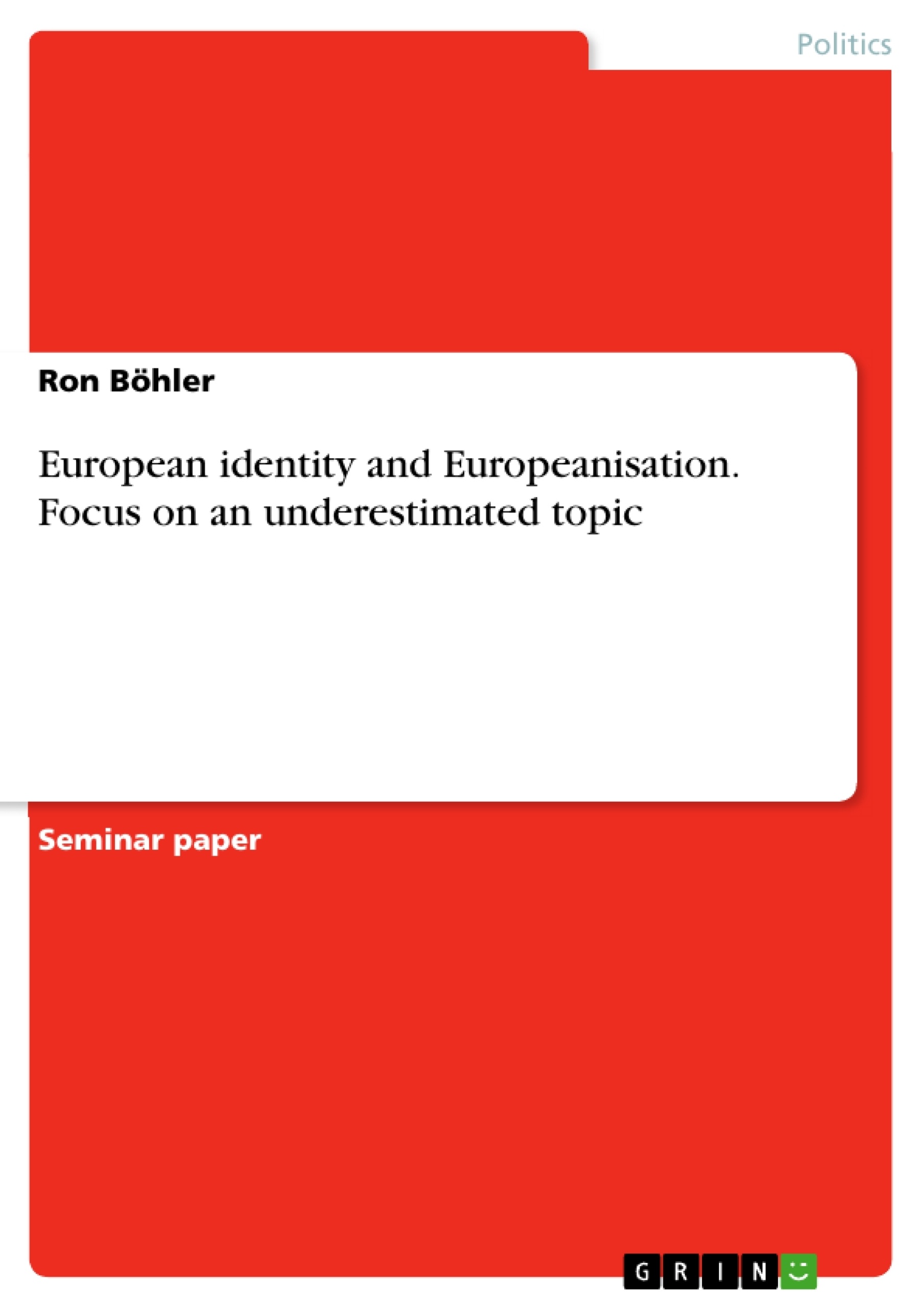This study examines the concept of a general European identity. First, the underlying concept of ‘identity’ in the European socio-political context will be defined and elaborated in its different levels and peculiarities. Second, the study addresses the various theories of Europeanisation as they mirror the current state of the scientific debate. The essay concludes by extracting the additive of the concept of ‘identity’ for Europeanisation theories.
The European Union (EU) faces a dilemma: While life and politics of the European citizens become more and more Europeanised, the emergence of a European identity seems to fail. People all over Europe cannot identify with the idea of European unification as a whole, although this might spread peace, freedom and welfare. On the other hand, if the EU or its citizens themselves would be able to create European ‘imagined community’, by whatever means, the split between both concepts would be overcome. But how is the concept of ‘identity’ then connected to Europeanisation processes?
The main argument here is that ‘identity’ still is an underestimated object of Europeanisation theories, but that the rise of hybrid identities, and with it the manifestation of Europeanised national identities instead of a European identity all over Europe, holds the explicit potency to establish the missing relationship between European citizens and EU politics. This would lead suddenly to a strengthened legitimization of European Union policies as well as people´s belief in the justification of a supranational polity within a system of multi-level governance.
Inhaltsverzeichnis (Table of Contents)
- Introduction
- Concepts of 'identity' in Europe.
- Spheres of identity in the European Union
- Towards a European identity?
- Criticisms of identity formation in the EU.
- European citizenship: Any effect on identity?
- Theories of Europeanisation and European identities..
- Three major approaches…........
- Multi-level governance and the missing link to identity.
- Identity and Legitimacy in the European polity system ......
- Conclusion.......
Zielsetzung und Themenschwerpunkte (Objectives and Key Themes)
This research paper investigates the relationship between the concept of 'identity' and theories of Europeanisation, aiming to understand how the emergence of hybrid identities can contribute to legitimizing European Union policies and strengthening the link between citizens and the EU.
- The role of 'identity' in Europeanisation theories
- The formation of hybrid identities in the European context
- The impact of Europeanisation on national and European identities
- The relationship between European identity, legitimacy, and multi-level governance
- The potential for European identity to contribute to the democratic functioning of the EU
Zusammenfassung der Kapitel (Chapter Summaries)
The first chapter establishes the importance of understanding the concept of 'identity' in the context of European integration. It outlines the different levels and complexities of identity, highlighting the importance of recognizing the multi-layered nature of identity rather than focusing solely on a single European identity. The second chapter delves into the various theories of Europeanisation, examining their strengths and weaknesses in relation to the concept of identity. It particularly focuses on the need for a more nuanced understanding of the relationship between European identity and multi-level governance.
Schlüsselwörter (Keywords)
This research paper focuses on key concepts such as European identity, Europeanisation, hybrid identities, multi-level governance, legitimacy, and democracy in the European context. It explores how these concepts are interconnected and contribute to understanding the evolving relationship between citizens and the European Union.
Frequently Asked Questions
What is Europeanisation?
Europeanisation refers to the processes by which national policies, identities, and legal systems adapt to the integration and policies of the European Union.
Is there a common European identity?
While a single European identity is slow to emerge, research suggests the rise of "hybrid identities" where national and European identities coexist and overlap.
Why do people struggle to identify with the EU?
Despite the benefits of peace and welfare, many citizens find it difficult to identify with the EU as an "imagined community" compared to their national identity.
How does identity relate to EU legitimacy?
A strengthened European identity would lead to better legitimization of EU policies and increase belief in the justification of a supranational polity.
What is multi-level governance in the EU?
It is a system where power is shared across different levels (local, national, and European), which complicates the formation of a single unifying identity.
- Citar trabajo
- Ron Böhler (Autor), 2010, European identity and Europeanisation. Focus on an underestimated topic, Múnich, GRIN Verlag, https://www.grin.com/document/376553



